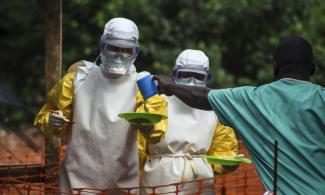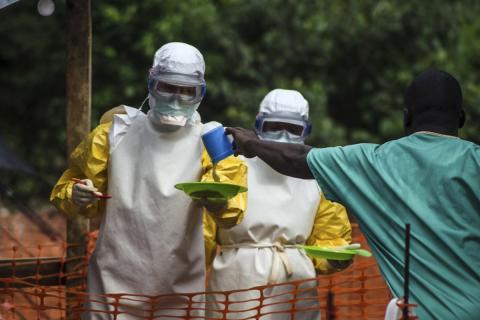
A statement emanating from the Ministry of Health confirmed that some fishermen working on the borders of Liberia have returned to Ghana showing symptoms of EVD.
Health authorities in Ghana have issued a red alert for the deadly Ebola virus ravaging the region. A statement emanating from the Ministry of Health confirmed that some fishermen working on the borders of Liberia have returned to Ghana showing symptoms of EVD.

The statement further advised people to keep and use hand sanitizers often.
Meanwhile, three persons have been quarantined at the Nsawam Government hospital in the Eastern Region for supposedly showing signs of the disease.
Hospital authorities revealed that blood samples of the patients have been taken for testing at the Noguchi Memorial Institute in the capital Accra. They did not reveal too much detail about the patients except to say that they were a 16-year old girl, a 56-year old man and a 53-year old man; all Ghanaian.
These cases have - if proven - surfaced in the southern and eastern parts of the country. Meanwhile, in the north, the Ghana Health Service says it is awaiting test results of a Burkinabe, who was admitted at a health facility in Bawku in the Upper East Region with signs reminiscent of an ebola attack.
West Africa is experiencing an unprecedented outbreak of the Ebola Virus Disease (EVD). Liberia and Sierra Leone seem to be the hardest hit with Nigeria also reporting a recent case.
Highlights:
The Guinean Ministry of Health, the Ministry of Health and Sanitation of Sierra Leone, the Ministry of Health and Social Welfare of Liberia, and the Nigerian Ministry of Health are working with national and international partners to investigate and respond to the outbreak.
Guinea
August 6, 2014, the Guinea Ministry of Health announced a total of 495 suspect and confirmed cases of Ebola virus disease (EVD), including 367 fatal cases. Affected districts include Conakry, Guéckédou, Macenta, Kissidougou, Dabola, Djingaraye, Télimélé, Boffa, Kouroussa, Dubreka, Fria, Siguiri, Pita and Nzerekore; several are no longer active areas of EVD transmission. 355 cases across Guinea have been confirmed by laboratory testing to be positive for Ebola virus infection. In Guinea’s capital city, Conakry, 95 suspect cases have been reported to meet the clinical definition for EVD, including 42 fatal cases.
Liberia
August 6, 2014, the Ministry of Health and Social Welfare of Liberia and WHO have reported 554 suspect and confirmed EHF cases (including 148 laboratory confirmations) and 294 reported fatalities.
Nigeria
August 6, 2014, the Nigerian Ministry of Health and WHO reported 13 suspect cases and 2 fatal cases.
Sierra Leone
August 6, 2014, the Ministry of Health and Sanitation of Sierra Leone and WHO reported a cumulative total of 717 suspect and confirmed cases, including 631 laboratory confirmations and 298 reported fatal cases.
Cases have been reported from all 12 Sierra Leone districts.
About the virus:
Genetic analysis of the virus indicates that it is closely related (97% identical) to variants of Ebola virus (species Zaire ebolavirus) identified earlier in the Democratic Republic of the Congo and Gabon (Baize et al. 2014).
Cases by Country:
Guinea
Suspected and Confirmed Case Count: 495
Suspected and Confirmed Case Deaths: 367
Laboratory Confirmed Cases: 355
Liberia
Suspected and Confirmed Case Count: 554
Suspected and Confirmed Case Deaths: 294
Laboratory Confirmed Cases: 148
Nigeria
Suspected and Confirmed Case Count: 13
Suspected and Confirmed Case Deaths: 2
Laboratory Confirmed Cases: 0
Sierra Leone
Suspected and Confirmed Case Count: 717
Suspected and Confirmed Case Deaths: 298
Laboratory Confirmed Cases: 631